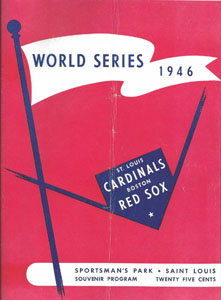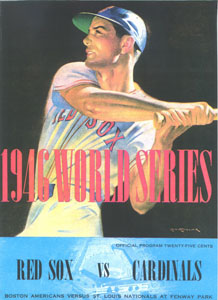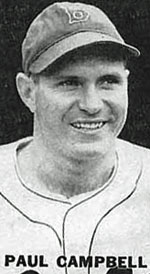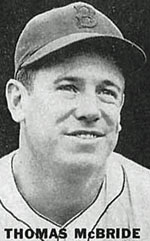1946 - Game 7: Boston Red Sox @ St. Louis Cardinals
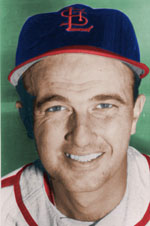
Howie Pollet
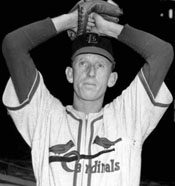
Al Brazle
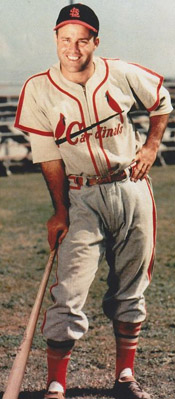
Joe Garagiola
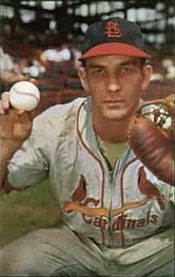
Del Rice
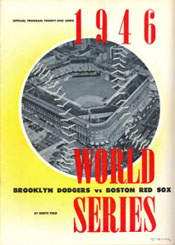
Proposed cover for Dodgers' 1946 World Series program
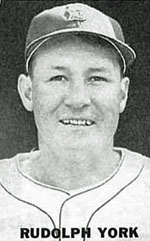
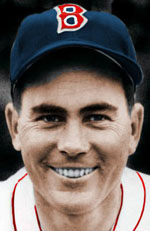
Tex Hughson
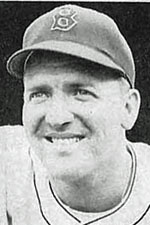
Mickey Harris
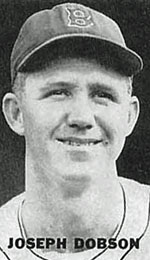
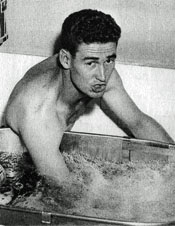
Williams with his injured elbow in the whirlpool
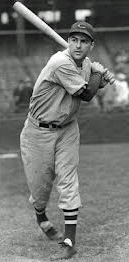
Lou Boudreau
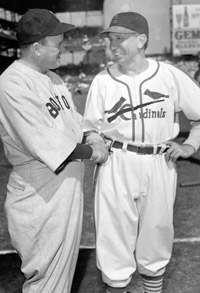
Joe Cronin and Eddie Dyer at start of Series
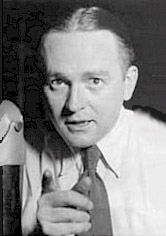
Arch McDonald
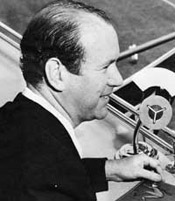
Jim Britt
|
Pennant Races
Baseball returned to its prewar quality with all hands on deck for the '46 season.
- Two-thirds of the regulars on 1945 ML rosters either went to the bench or the minors for the next season.
- Most of the other one-third who kept their starting jobs didn't fare as well at the plate or on the mound.
The best illustration of this is Yankee 2B Snuffy Stirnweiss, who led the AL in hits in both '44 and '45 and won the batting crown in the latter year, fell to .251 in '46 when facing top-notch pitching.
A pitching example is Hank Borowy, whose hurling down the stretch helped the Cubs to the '45 pennant. His ERA rose from 2.65 that year to 3.76 in '46 and his wins shrank from 21 to 12.
Glad to be rid of wartime restrictions and anxious to see their favorites back in action, fans flocked to ballparks in record numbers.
- Almost twice as many patrons went through ML turnstiles in '46 as in '45.
- Entering '46, only five ML franchises had ever topped the million mark in season attendance, including the Giants who attained that milestone in '45.
- But 1946 saw a whopping ten clubs draw 1,000,000+ with the Yankees entertaining an incredible 2,265,512, an average of 29,422 per home date.
- Both pennant winners reached 1,000,000 attendance for the first time in their history.
The National League race was 1941 and '42 over again as the Dodgers and Cardinals rose to the top two spots in the standings by the end of April and stayed there the rest of the campaign. In fact, the regular season wasn't enough to separate the two clubs.
The Cardinals lost their manager but gained 22 players who had spent all or most of the 1945 season in the service.
- Billy Southworth resigned in the off-season to take over the Boston Braves. Cardinal owner Sam Breadon, acting as his own GM, hired 46-year-old Eddie Dyer, who had won 15 pennants in the vast St. Louis farm system and spent several years as minor league director for the club.
- Among those returning from the military were outfielders Stan Musial, who was moved to 1B, Enos "Country" Slaughter, and Harry Walker and pitchers Howie Pollet, Murry Dickson, and Al Brazle.
Johnny Beazley, star of the '42 World Series, also returned but was not the same after suffering a sore arm while pitching for a traveling morale-boosting unit that visited numerous Army bases. Johnny finished '46 with a 7-5 record and 4.46 ERA and would be traded to Boston where he won only two games in '47 for his former manager Southworth.
The Cardinals also lost three players to the new Mexican League: Pitchers Max Lanier and Fred Martin and 2B Lou Klein. Lanier was 6-0 for the Redbirds when he bolted south in June, lured by the much larger salary that Mexican millionaire Jorge Pascual offered.
- C Walker Cooper, a mainstay with his brother Mort of the pennant-winning teams of '42, '43, and '44, was traded to the Giants to make room for two promising youngsters, Del Rice and Joe Garagiola. His brother Mort, top P, had already been traded to the Giants in '45.
- Musial destroyed any skepticism that he could repeat his outstanding '43 and '44 seasons now that the best pitchers were back. This was the season that he earned the nickname "Stan the Man" based on a chant the Brooklyn fans started. He led the league in runs, hits, doubles, triples, batting average, and slugging %. (He also led in OPS, on-base + slugging %, a statistic that wasn't calculated until decades later.) Musial's .365 average was 32 points better than second-place Johnny Hopp, whom the Cards had traded to the Braves. Stan ran away with the MVP voting (319-159).
Many years later, Musial talked to Tim McCarver about moving to 1B. I loved playing the outfield and expected to stay out there, but in 1946 our highly touted rookie first baseman, Dick Sisler, had trouble getting started. So, one day our manager, Eddie Dyer, came to me and said, "Why don't you take over at first base for a few days, until we get Sisler squared away." ... I moved back and forth between first and the outfield for the rest of my career. I didn't like playing first base. First of all, it's a lot of work, whereas in the outfield, if the ball is hit to someone else, all you do is watch. At first base, you're jumping off on every pitch. You're making plays; you're backing up plays; you're charging bunts; you're taking throws - you're in on every play, more or less. But the main reason I didn't like playing first is I didn't like ground balls. They got to me a lot quicker at first than they did when I was in the outfield.
- But the bedrock of Dyer's club was the pitching staff, which compiled an ERA of 3.01, best in league ahead of Brooklyn's 3.05. Pollet led the NL in both wins (21) and ERA (2.10), proving that his '43 league-leading ERA of 1.75 wasn't a fluke either. Lefty Harry "The Cat" Brecheen won 15 for the second straight season, and Dickson contributed another 15.
The Dodgers also benefited from returning veterans in the field and on the rubber.
- Pete Reiser and rookie Carl Furillo considerably improved the outfield both offensively and defensively.
- Pee Wee Reese did the same for the crucial SS position.
- 31-year-old Kirby Higbe resumed his spot as #1 starter, winning 17 games. Southpaws Joe Hatten and Vic Lombardi contributed double-digit win totals, as did relievers Hugh Casey and Hank Behrman.
- Just as they were second behind the Redbirds in ERA, the Dodgers also ranked second in runs (712-701). RF Dixie Walker knocked in 116 runs, 43 more than the next Dodger, Reiser, and finished second for league MVP.
St. Louis lost to the Cubs at home on the last Friday of the regular season to drop into a tie with Brooklyn.
- Both teams won on Saturday but lost on Sunday to force the playoff, the first ever in either major league.
The Dodgers' last-day defeat came at the hands of Mort Cooper, the Cardinals' bell cow from '41-44 who had been traded to the Boston Braves in 1945. Pitching on two days rest, Mort twirled a four-hit 4-0 shutout in Ebbets Field.
- NL rules called for a best-of-three match up with the first game at one city and the other two at the other city. When Brooklyn won the coin flip, manager Leo Durocher chose to open in St. Louis so that he could get two home games.
- Both teams battled injuries. Reiser, an inspirational leader and the most dangerous base stealer in baseball, couldn't play because of a broken ankle. On the other side, Cardinal SS Marty Marion struggled with a bad back.
- On Tuesday, October 1, Pollet, despite a pulled muscle in his left side that had caused him to be knocked out of the box his last two starts, out-pitched righty Ralph Branca, who had started only 10 games during the season. Garagiola, a .237 hitter for the season, went 3-for-4 and drove in two runs to spark the Redbird attack.
- Two days later at Ebbets Field, Dickson held the Bums to one run over eight innings as his mates pounded Hatten and five relievers for eight runs. The Dodgers rallied for three in the ninth, causing Dyer to bring in Brecheen to get the last two outs.
- Dodger fans lambasted Durocher for opening on the road. Some felt the long train ride from Brooklyn to St. Louis for Game One wore out the Dodgers.
In the Junior Circuit, the Red Sox made the World Series for the first time since 1918, a year before the club traded Babe Ruth to the Yankees.
- Ted Williams returned after contributing three seasons of his prime to his country. "The Kid" showed no signs of rustiness, topping the AL in runs, slugging %, total bases, and walks. His 156 free passes were the most in history by any player not named "Babe Ruth." Ted's .342 BA would have won that crown in almost any year but was good only for second to Mickey Vernon's .353 for the Senators.
- But the Red Sox had gotten powerful production from Williams his first four seasons in the league without winning the pennant. The difference in '46 was strong seasons by many teammates, including: 1B Rudy York (119 RBIs), 2B Bobby Doerr (116 RBIs), SS Johnny Pesky (.335 BA with 115 R), and CF Dom DiMaggio (.316 BA to go along with his outstanding fielding).
- And no team wins 104 games without solid pitching. Dave "Boo" Ferriss (age 24) won 25 and lost only six while veteran Tex Hughson (30) added 20 wins and a fine 2.75 ERA. Lefty Mickey Harris with 17 and Joe Dobson with 13 also chalked up double digit victory totals.
- A respectable third in runs allowed, Boston led in runs scored with 737, nearly 100 more than the Yankees' 626.
- The result was a pennant romp by 12 games over Detroit and 17 over the Yankees.
The Red Sox lost seven straight games before finally clinching the pennant on Friday, September 13. Boston mayor James Curley ordered the city's firemen to sound sirens, gongs, and bells for a full 15 seconds.
Owner Tom Yawkey threw a party to celebrate the occasion. At odds with the press, he didn't want to invite them but also didn't want to offend them. So he held two separate gatherings, one for the players and one for the press. All he succeeded in doing was alienating the local writers even more. Al Hirshberg: We all felt like scullery maids, banished to the kitchen while the lords and masters enjoyed themselves in the main dining room. For the rest of their careers, Hirshberg, Dave Eagan, Austin Lake, Hy Hurwitz, Huck Finnegan, and others wrote negatively about their hometown team as no other group of writers did. Eagan specialized in trashing Ted Williams.
1946 Boston Red Sox
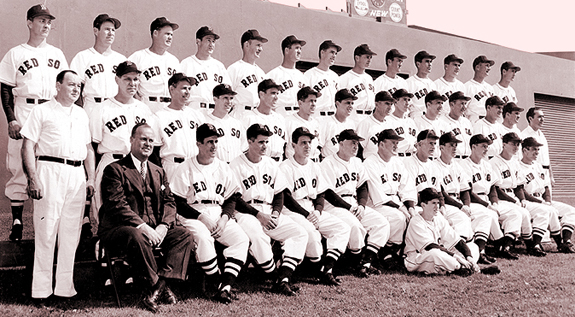
For the first time since 1908 when the Pirates with Honus Wagner and Ty Cobb's Tigers squared off, the '46 Series featured the MVPs of both leagues.
- Odds makers considered Boston the favorite.
- However, an incident that occurred while the NL playoff was taking place affected the Red Sox much more than was apparent at the time.
- Faced with at least five days off before starting the Series, the Red Sox organized a team of players from the other AL squads to play them in a three-game series. During the second game, a curveball from Mickey Haefner of the Senators nailed Williams on his right elbow. Although Ted shrugged off the injury, it bothered him throughout the Series.
The crowds for the exhibition series were disappointing to say the least. Only about a thousand people attended the first game and perhaps two thousand for Game 2 on a 30° day. Hefner explained his pitch that hit Williams. I tried to throw a curve to Ted, but my hands were so cold I just couldn't break it off.Ted's elbow turned blue and swollen. His wife said he was in agony all night.
To show the state of his relationship with the Boston press, one reporter insinuated he was goofing off when he and his wife went shopping the next day. Another scribe erroneously wrote that he had gone fishing.
- Another inhibiting factor for Ted was Dyer's decision to use the "Boudreau Shift" against the dead pull hitter (although before the Series, Eddie had indicated he wouldn't use the shift). Cleveland SS-manager Lou Boudreau moved his 2B and SS far to the right of their straightaway positions. That left only the third baseman between 2B and 3B.
- Other teams in the AL copied what the Indians did with variations. But, as Williams' numbers for 1946 illustrate, the ploy couldn't be classified as a success. Boudreau later admitted that the shift was more about psyching out Williams that getting him to poke the ball to LF.
- Dyer modified the shift to fit his personnel. At the suggestion of 3B Whitey Kurowski, he left his 6'2" wide-ranging SS Marion in his usual position but moved Kurowski from 3B to deep second. 1B Musial hugged the foul line with 2B Red Schoendienst between him and Kurowski.
- But the Cardinals knew that just a shift wasn't enough. Two Cardinal scouts, Tony Kaufmann and Ken Penner, had tracked the Red Sox most of September. Based on their reports, the St. Louis brain trust crafted a plan to foil Williams. Ted's biographer Michael Seidel put it this way: Don't try to throw the right pitch, try to throw the unusual pitch. Take chances, pitch to his power; throw breaking stuff whatever the count. Williams was very much a guess hitter and the Card pitchers were told not to set or fall into patterns that he could guess consistently.
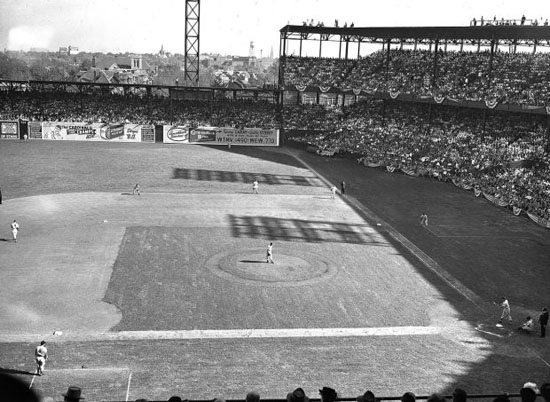
The Cardinals' version of the "Williams Shift" - SS Marty Marion is alone on the left side of 2B. With wartime travel restrictions ended, the Series returned to its traditional 2-3-2 format, starting in St. Louis.
- The teams would play six straight days with a day off after Game 6 if a seventh game was needed.
- The weather behaved marvelously in both cities, allowing the teams to play to their potential and produce a classic Series.
The Mutual Broadcasting System broadcast the Series coast-to-coast.
- Arch McDonald, the Senators announcer, and Boston's Jim Britt did the play-by-play. Bill Corum of the New York Journal American provided pre- and postgame commentary.
- The sub-par performance of the announcers provoked a flood of telegrams, postcards, letters, and phone calls to network headquarters.
- Cardinal fans, used to the colorful descriptions of Dizzy Dean and Harry Caray, were particularly upset with McDonald's spare, boring commentary.
- After the Series, MLB decided to review the method of choosing the Series broadcasters and decided to include at least one regular broadcaster of the two teams. (McDonald would never do another Series.)
|
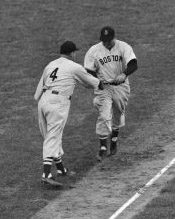
Cronin congratulates Rudy York after his 10th inning HR to win Game One
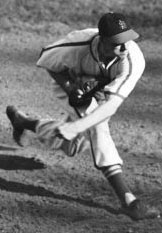
Brecheen hurls in Game 2.
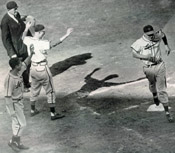
Del Rice scores on Brecheen's hit in Game 2
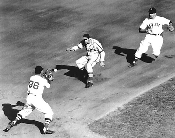
Musial caught in rundown in first inning of Game 3
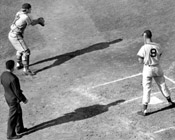
Williams walked intentional in inning 1 of Game 3
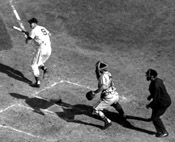
Williams bunts against the Shift in Game 3
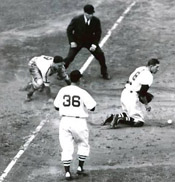
Slaughter overslides 3B in Game 4
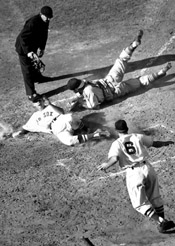
Roy Partee slides past Garagiola in Game 5
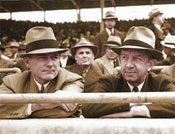
Red Sox owner Tom Yawkey with GM Eddie Collins
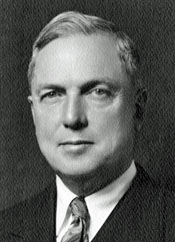
Cardinals owner Sam Breadon
|
Series Results
- Sunday, October 6 @ St. Louis: Red Sox 3 Cardinals 2 (10 innings)
WP: Earl Johnson; LP: Howie Pollet
- Monday, October 7 @ St. Louis: Cardinals 3 Red Sox 0
WP: Harry Brecheen; LP: Mickey Harris
- Wednesday, October 9 @ Boston: Red Sox 4 Cardinals 0
WP: Dave Ferriss; LP: Murry Dickson
- Thursday, October 10 @ Boston: Cardinals 12 Red Sox 3
WP: Red Munger; LP: Tex Hughson
- Friday, October 11 @ Boston: Red Sox 6 Cardinals 3
WP: Joe Dobson; LP: Al Brazle
- Sunday, October 13 @ St. Louis: Cardinals 4 Red Sox 1
WP: Brecheen; LP: Harris
Neither MVP had excelled at the plate.
- Whether it was Dyer's shift or the sore elbow or excellent Redbird hurling, Williams was 5-for-21 with just 1 RBI and no extra base hits. Ted did draw five free passes. One of his hits was a bunt down the 3B line in Game 3. Several Boston writers who made a name for themselves by blasting Ted had a field day. For example, Harold Kaese wrote in his Boston Globe column: As matters stand, Ted Williams is an enormous bust. Ted had contracted with the Globe to write his own column during the Series. He admitted: I said I would let my bat do the talking, and it's tongue-tied.
- Musial also had only five hits in 24 ABs. But the five included three doubles and a triple to produce 4 RBIs. Stan walked four times.
A Red Sox fan sent a card to Eddie Dyer expressing indignation at the Cardinals' shift.
Dear Mr. Dyer:
WHY do you prevent Ted Williams from making his usual home runs and bases, etc.? Are you afraid of him? I am a baseball fan for over 40 years and never saw such gangster methods as you and your players employ. You insist on intentional passes and then gather your players in front of him and switching and changing bases of your players. Are you so afraid of these fine Red Sox players that you cheat and steal on them - shame on you.
Yours truly, B. Moreland [Sounds like a woman to me.]
The note brought a laugh from Dyer, who said, I hope we can keep Ted upset for just one more day.
Harry Brecheen saved the Cardinals with two complete game victories, including Game Six when his club faced elimination.
- The southpaw from Broken Bow OK was listed as 5'10" 160 lb, but the Red Sox swore he weighed 150 or less. His '46 record was only 15-15 but he sported a sparkling 2.49 ERA, a hint that his teammates often let him down at the plate.
- Brecheen's best pitch was his screwball, followed by his curve. He used his middling fastball as a waste pitch to keep hitters off balance. He was the epitome of the "crafty left hander."
- Harry had great success against Williams, keeping him off balance with breaking balls down and away and pitches up and in. In nine ABs in Games 2 and 6, Ted was limited to a walk and what he called "one chicken-shit single." In his nationwide syndicated column during the Series, the Boston star described The Cat's twirling like this: Brecheen's pitches look nice to hit at, but when you try to hit him the ball just isn't where you think it's going to be. Ted made the point that the P always has the advantage over a hitter who hasn't seen him regularly. That was especially true of an unconventional hurler like The Cat.
Bobby Doerr: Brecheen threw a little screwball, a little sliding curve, and he mixed speeds. He wasn't overpoweringly fast. Our ballclub was a fastball-hitting club, a pull-hitting ballclub, and what we should have done with him was to hit him through the middle. But we didn't. And that hurt us.
Brecheen credited his success against the Red Sox in part to the fact that he faced them in spring training. I had a good idea of how to pitch them. They had a great hitting club. If you didn't stay ahead, they could hurt you.
- Going into Game 7, little did anyone know that Williams would get another shot at Brecheen.
Brecheen's teammates were especially grateful to him for overcoming a blunder by Sportsman's Park PA announcer Charley Jones. As Brecheen warmed up for the 9th inning, Jones told fans that tickets for Game Seven would go on sale the next day, a prescheduled off day in the Series. The Cardinal dugout went berserk because Jones had, as one writer put it, "spit at the baseball gods." We were ready to shoot that guy, said Red Munger.
- Cronin was questioned about using starter Tex Hughson for 4 1/3 innings of relief in Game Six. Tex pitched scoreless ball, holding the Cards to a 3-1 lead before being pulled for a pinch-hitter.
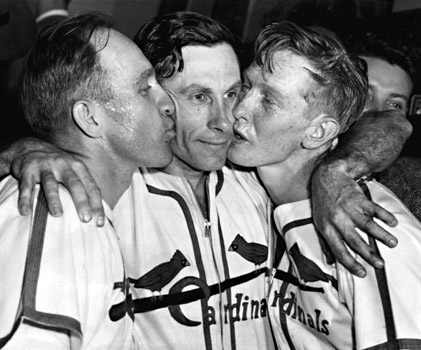
Kisses for Brecheen from Slaughter (L) and Schoendienst after Game 6
Many out-of-town fans spent the off day trying to secure a place to stay.
- A housing shortage plagued the entire nation as hundreds of thousands of veterans returned from the service.
- But the problem in St. Louis was exacerbated by the fact that the delay in starting the Series after the National League playoff led to a conflict for Games 6 and 7 with a convention and conference that consumed most of the hotel space.
- A large number of baseball visitors slept in cots in hotel dining rooms or on park benches.
Game 7: Tuesday, October 15 @ St. Louis
Neither manager hesitated in naming his starter.
- Boo Ferriss, the pride of Mississippi State University, had shut out the Redbirds in Game 3, scattering six hits. He was well-rested after five days off. In two seasons with the Red Sox after military service, Boo had won 46 games and dropped only 16.
- Dyer completed the rematch of the third game by choosing Tracy MO's Murry Dickson, a wiry right hander about the same size as Brecheen. Returning to the Cards in '46 after two years in the military, Murry finished 15-6 with an ERA of 2.88.
- This was the tenth time the World Series had gone to a seventh game with the Redbirds' participating for the fourth time. They had won all three of their previous ultimate games (1926, 1931, 1934).
- That streak would conflict with the Red Sox streak of having won all five World Series in which they participated, although the last one was 1918.
Both teams worked out on the off day with some conspicuous absences.
- Cronin said that his fleet CF Dom DiMaggio needed rest more than practice. Joe added, We knew that Harry Brecheen would be our toughest pitcher to beat. Well, we think that the next game belongs to us. I think the boys are about ready to break out with a rash of base hits.
- Four Cards didn't show for drills. Howie Pollet's sore back received treatment in case the southpaw was needed in relief. The middle infield combo, Marion and Schoendienst, rested. But the worst case was Slaughter, who had his injured right arm worked on by the club physician. An errant pitch from Joe Dobson pitch had nailed him on the right elbow, just as happened to Williams right before the Series. Doc Hyland told me not to throw hard, Enos said of Game 7. But if it means the game, maybe I'll cut loose.
Schoendienst suffered shoulder problems from his headfirst slides.
On the train ride to St. Louis after Game 5, Hyland had put bags of ice on Slaughter's elbow. Fearful that the blood clot in the elbow would move toward the heart, Doc told his patient that he'd have to miss the rest of the Series. But Enos wouldn't hear of it. I ain't gonna do it. The fellers need me. No matter what you say, I'm playin'. He recalled years later, I wouldn't give nobody the satisfaction of knowin' I was hurt.
The Red Sox were loose before the ultimate game.
- They had fun on the bus from the hotel to the park. Cronin gave popular trainer Win Green a drum. Happy as a child getting a rattle, Green beat out the Marine Hymn as he led the team procession to the dressing room. Greenie also serenaded Boo Ferriss while the big pitcher waited alone in the deserted dressing room before the game.
Ferriss recalled growing up in Shaw MS: I was a real diehard Cardinals fan as a kid. I can remember listening to them on KMOX radio, and following Dizzy Dean and his brother Paul. I remember listening to Game 7 in 1934 when Dizzy beat the Tigers for the World Championship. He was excited before the 1946 Game 7 but not overly anxious. I can remember the night before the game, my brother and I went to the movies. He couldn't sit still he was so worked up. He told his brother, Will you relax? I'm the one pitching tomorrow.
- The skipper also gave avid fisherman Williams a present on the bus, a pocket book entitled "To Hell with Fishing."
- The Boston Traveler reported Cronin as making this "fight talk" to his club before they took the field for the final game: You fellows are going to play the greatest game of your lives today. Play it like any other game. Win, lose, or draw, I thank you for being so nice to me all year.
- In the other clubhouse, Dyer eschewed all the pep talk material fans had sent him and gave a simple speech. All season you've won the ball game you had to win. Now let's go.
The Monday hiatus allowed Dyer to envision using Brecheen in relief if necessary in Game 7. But a monkey wrench was thrown into that plan when Harry showed up for the final game feeling terrible. He traced his illness to the aftermath of Game 6. By the time he got to shower after talking to reporters, all the hot water in the outdated clubhouse was gone. He figured the chilly shower weakened his immune system. I had a fever and a cold and my head was about to bust open, he explained after Game 7. He "filled up on aspirin," bundled up despite the warm weather, and huddled in the dugout not expecting to see any action.
36,143 jammed Sportsman's Park (listed capacity 30,611) on a shirtsleeve 70° afternoon to watch what almost every baseball historian regards as a Top Five Game Seven.
Standing room ticket holders jammed every ramp and aisle and blocked concession stands. Few had a decent view of the field. Some reporters needed a half hour to push their way through the throng and climb the stairs to the press box.
Back in Boston, thousands gathered on the Common to listen to the broadcast over PA speakers. Thousands more filled the Hatch Memorial Shell where the Boston Pops played its concerts.
Vendors made a nice profit selling refreshments, especially cold drinks on the unseasonably warm day.
With the nation suffering from a post-war meat shortage
(that many blamed on the continuation of the wartime price controls), Cardinals owner Sam Breadon had his aides scour the area on the off day for meat and alcohol to serve to the press - even if they had to pay exorbitant prices. As a result, reporters enjoyed a veritable feast for lunch before the game. Even Breadon and Red Sox owner Tom Yawkey partook.
Dignitaries in attendance for Game 7 included Happy Chandler, finishing his first season as Commissioner of Baseball, the two league presidents, Ford Frick (NL) and Will Harridge (AL), retired greats like Rogers Hornsby (who had picked the Cards to win in seven), Tris Speaker, Arky Vaughn, and the hero of the Cards' 1926 World Series triumph, Grover Cleveland Alexander. Also present was Jimmy Doolittle, the Missourian who led the air raid on Tokyo shortly after Pearl Harbor.
(Hornsby said of Williams, He's gonna be a great hitter, but he'll never be great until he learns to hit to every field.)
|
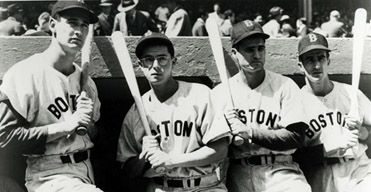 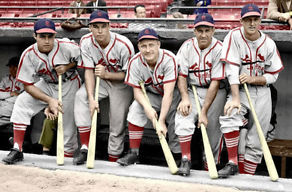
L: Red Sox hitters Williams, DiMaggio, Doerr, Pesky
R: Cardinal hitters
Garagiola, Dick Sisler, Kurowski, Slaughter, Musial
Boston Lineup
| Wally Moses |
RF |
| Johnny Pesky |
SS |
| Dom DiMaggio |
CF |
| Ted Williams |
LF |
| Rudy York |
1B |
| Bobby Doerr |
2B |
| Pinky Higgins |
3B |
| Harold Wagner |
C |
| Dave Ferriss |
P |
|
 |
 |
St. Louis Lineup
| Red Schoendienst |
2B |
| Terry Moore |
CF |
| Stan Musial |
1B |
| Enos Slaughter |
RF |
| Whitey Kurowski |
3B |
| Joe Garagiola |
C |
| Harry Walker |
LF |
| Marty Marion |
SS |
| Murry Dickson |
P |
|
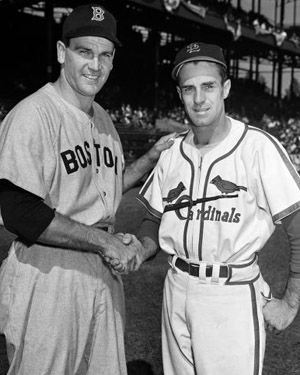 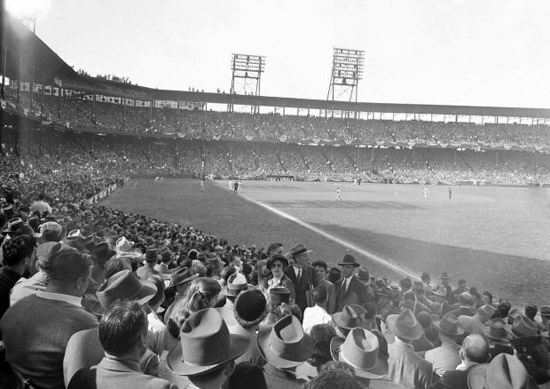
L: Starting pitchers Boo Ferriss and Murry Dickson before Game 7; R: Packed house at Game 7 |
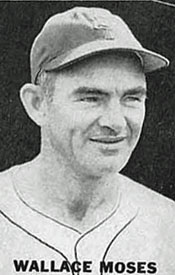
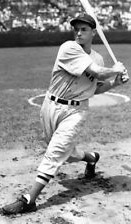
Dom DiMaggio
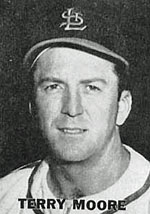
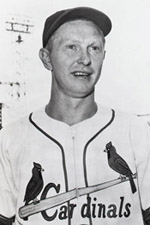
Red Schoendienst
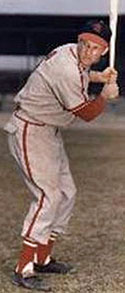
Stan Musial in his unique stance
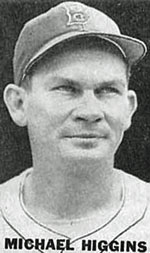
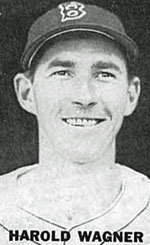
|
1st inning
- Dickson was determined to start better than he had in Game 3 when he gave up a three-run homer to Rudy York in the first inning.
Murry blamed his
Game 3 troubles on the fact that his pregame warm-up was repeatedly interrupted by photographers running between him and the plate. As a result, his arm didn't get loose enough in the chilly air. For Game 7, both managers requested that the field be cleared of reporters and photographers at 1 PM so that pitchers would not be interrupted in their preparations. But Dickson still didn't get the results he wanted when the game began.
Left-handed hitting RF Wally Moses singled up the middle.
Pesky swung at Dickson's first pitch and sent it bounding over 2B past Marion's glove into CF, sending Moses to 3B. A few inches to the left and Marty would have snagged the ball, stepped on 2B, and throw to 1B for a DP.
DiMaggio flied to Slaughter in deep RF. Even Country's best throw with a sound arm couldn't have prevented Moses from scoring easily after the catch. This was not scored as a sacrifice fly in 1946.
Facing the usual shift, Williams smacked a high drive to CF. Playing Ted to pull, 34-year-old Terry Moore, once considered as good as anybody in CF, showed signs of his younger self despite a floating cartilage in his knee that would require surgery in the offseason. He raced under the fly and took it with ease. Pesky, all the way to 2B, hurried back to 1B. Williams trotted back to the dugout wondering what he had to do to get a hit. 1st base coach Del Baker patted him on the back as he passed by.
York popped to 2B Schoendienst in short RF.
1-0 Boston - since the team that scored first won each of the first six games, this boded well for the Red Sox
- Switch-hitting Schoendienst, batting left against Ferriss, drilled a single through the hole between 3B and SS. When Williams momentarily bobbled the ball, Red tried to make 2B but was out, Williams to Pesky. The play was typical of the aggressive baserunning the Cards had exhibited throughout the 1940s.
Moore popped to York in on the grass.
From his unique stance - "a hunched, butt-out coil" as one writer described it, Musial lined a double down the LF line, Stan's fourth two-bagger of the Series.
Stan: My stance was very unusual, but it was very comfortable. It came about because I wanted to be a .300 hitter. I started a crouch to shorten my strike zone, because I usually punched the ball the opposite way ... rather than pulling it. Although it was unorthodox, I always took a good level swing. ... That low crouch of mine really helped me. Naturally, I love the low pitch. ... I was a low-ball hitter and a highball drinker.
Slaughter, swinging gingerly because of his elbow and shaking out his injured arm after every pitch, watched a third strike breeze by.
2nd inning
3rd inning
- Dickson fared much better through the order the second time.
Moses fouled out to Kurowski.
Pesky spanked a hot grounder than Schoendienst got in front of to throw him out.
DiMaggio took a called third strike, the first K for either team.
- Dickson went down swinging.
Schoendienst whacked a wicked grounder that Pesky swooped up with his gloved hand and tossed to 1B for the out.
Moore skied to Williams.
4th inning
- With Williams at the plate, Walker played around toward CF. From that position, he ran down Ted's long curving fly.
York struck out.
Doerr flied to Slaughter.
- Musial drew a walk.
Slaughter lifted a foul fly that Pesky took down the LF line.
Kurowski flied deep to CF.
Garagiola rolled out 4-3.
5th inning
- Higgins smashed a blazing liner to LCF, but Moore again prevented extra bases with a spectacular backhanded catch before almost crashing into the wall at the 400' mark.
Dyer after the game: There never was a greater catch made by any ball player, anywhere, than Moore's great running catch (robbing Higgins). How he ever caught up with the ball, lame as he is, is something I'll never understand, but that's the way he does things. He just makes up his mind and goes ahead and does it, no matter how difficult.
Wagner fouled to Kurowski.
Ferriss sent a high bouncer back to Dickson, who threw him out. Murry had now retired 12 in a row.
- Walker singled past Pesky's outstretched glove.
Dyer surprised everyone by having 8th place hitter Slats Marion sacrifice. York fielded the bunt along the 1B line and threw back to Doerr covering 1B.
The Cardinals organization prided itself on the hitting ability of its pitchers. And Dickson, a .277 hitter for the season, rewarded his skipper's faith by dumping a double over 3B, scoring Walker with the go-ahead run and provoking still another roar for Murry.
Ferriss was peeved because the pitch had completely fooled the hitter. His pants were in the grandstand, he said afterwards, meaning Murry had stepped away from the plate to avoid the sharp-breaking curveball but managed to get his bat on the ball.
Schoendienst smashed the first pitch on a line over 2B for a single. DiMaggio charged the ball but bobbled it, eliminating any chance of getting Dickson at home.
Moore continued the onslaught, knocking Ferriss out with a single into CF that put Red on 2B.
Cronin brought in RHP Joe Dobson, the winner out of the bullpen in Game 5, to pitch to Musial.
Some Red Sox thought their manager had lifted Boo prematurely. But the pitcher himself understood, as he recalled years later. They had to replace me. I wasn't getting them out, and the whole season was on the line. We had to try to keep it close. Ferriss always considered winning Game 3 as his biggest thrill and losing Game 7 as his biggest disappointment.
Stan bounced out Doerr to York, advancing both runners.
The Red Sox purposely passed Slaughter to fill the bases.
Was Kurowski thinking about the grand slam he hit to win the fifth and final game of the 1942 Series against the Yankees? The outcome was quite different this time. Higgins backed up to snare Whitey's bouncer and whipped to Doerr to force Slaughter at 2B.
Cardinals 3 Red Sox 1
|
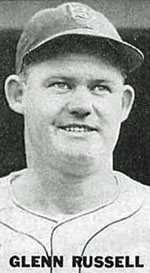
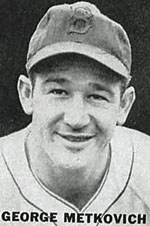
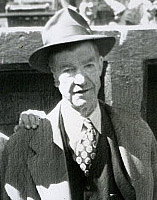
Hall of Fame P Grover Cleveland Alexander at the 1946 World Series in St. Louis
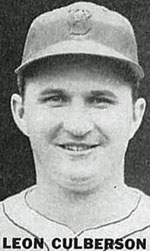
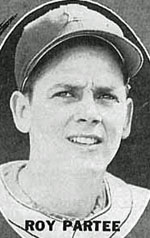
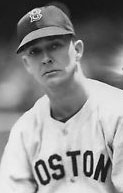
Bob Klinger
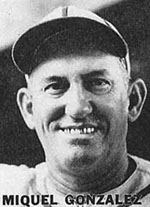
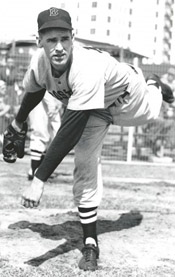
Earl Johnson
|
6th inning
- Moses slapped a roller to Musial who made the play unassisted.
Pesky lined to Kurowski.
The last thing Murry wanted to do was walk DiMaggio with Williams up next, but that's what he did, ending his streak of retired batters at 14.
But
the best Ted could do was send a skyscraper to Slaughter in RF. The Splinter slammed his bat down in disgust.
- Dobson fanned Garagiola.
Walker drew a base on balls.
Marion grounded to Doerr, Walker taking 2B.
Dickson hit the first pitch for another 4-3 out.
7th inning
- Dickson continued to bedazzle the Sox with his wide assortment of pitches.
York stuck out for the second time.
Doerr hit a fly to CF.
Marion scooped up Higgins' grounder and threw him out.
- Schoendienst swung and missed the 3-2 delivery.
Doerr collided with CF Moses going after Moore's fly in short RF but held on to the ball for the putout. Each fielder came up limping.
Dobson knocked down Musial's hot smash back to the box and easily tossed him out at 1B.
8th inning
- Now began one of the most famous innings in World Series history.
Thinking ahead, Dyer walked over to where Brecheen shivered miserably in the corner of the dugout and asked him how he felt. My arm feels okay, at least, the Cat replied. So Harry headed to the bullpen to get ready in case he was needed.
Needing to inject some life into his team with time running out, Cronin turned to his bench. First, he sent up
Glenn "Rip" Russell to hit for C Wagner, a .208 right-handed hitter in place of a .230 lefty who was 0-for-13 in the Series. But the hunch worked as Rip lined a curveball into CF for a single, the first hit off Dickson since the second inning.
Joe's next decision was a no-brainer. George "Catfish" Metkovich hit for P Dobson. The left-handed batter sent a screaming double down the LF line. Cronin, coaching 3B, stopped Russell there.
With another lefty, Moses, due up, Dyer came out and called for Brecheen.
Dickson angrily went to the locker room, showered, and left the park. He drove around listening to the game on the radio. When he tried to return to join in the postgame celebration, he couldn't get through the packed streets.
The switch started well, as Wally whiffed on three pitches. He protested the call on the final curveball, claiming it was low.
Then Slaughter came in fast to catch Pesky's low liner and hold the runners on their "respectable bases," as Dizzy Dean would say.
One more out and The Cat would add to his two complete game victories a sparkling save and bring back memories of Grover Cleveland Alexander's relief stint against the Yankees in Game 7 of the 1926 Series.
Alexander, age 59, was in attendance but suffered a heart attack as he left the game and had to be taken to a hospital. He was reported as resting comfortably that night.
But if Harry was a thinking man's pitcher, DiMaggio was a thinking man's hitter. That's why they called him the "Little Professor." Years later, he could remember every pitch of the at-bat and what he was thinking.
Brecheen started with a high fastball that home plate umpire Al Barlick called a strike, to Dom's surprise. When he protested, the ump told him to get in there and hit. Next came a curve inside to make the count 1-1. Harry tried two screwballs in a row, both down and away. Dom bit on neither to make it 3-1.
He stepped out and looked to Cronin in the 3B coaching box for a sign. Told to hit away, the professor considered the possibilities. He ruled out a fastball, The Cat's weakest pitch. Also, the lefty hadn't been getting his curve over that day. And he didn't want to walk Dom with Williams up next. So it would be another screwball but not inside where the hitter could pull it. Only one possibility remained - the same outside screwball as the last two pitches but in the strike zone. Brecheen would want Dom would try to pull it and hit a weak grounder. So DiMag resolved to go with the pitch. Sure enough, Brecheen threw a screwball that "was just a bit too high" (to use Harry's description), and Dom smashed it off the wall at the 354' mark in RCF, missing a HR by two feet. Thinking triple, Dom ran as hard as he could around first until he felt a hamstring pop. He hobbled into 2B with a double as the tying runs scored. The only noise in the stadium came from the Red Sox dugout.
The good news for the Sox was they tied the score. The bad news was that Dom had to leave the game. Backup OF Leon Culberson ran for him. Cronin had no choice, but the move would have dire consequences.
After a 20-minute delay, the game resumed with Williams stepping in with a chance to drive in the go-ahead run and erase all the negative press he had received since falling into a slump in mid-September. (Ted had not homered since September 13.) He would go from Goat to Hero. The Cardinals lost a player as a foul tip off Williams' bat split the third finger of Garagiola's right hand. Del Rice replaced Joe behind the dish, delaying the game a few more minutes, enough time for Ted to analyze the situation and decide Harry would go with his best pitch, the screwball. Instead, Brecheen jammed The Splinter with a fastball. The result was a towering popup close to the RF line that Schoendienst caught.
Since the Red Sox would never appear in another Fall Classic during his career, Ted's World Series line was frozen for all time at 5-for-25, .200, 2 R, 1 RBI, 0 HR, 5 BB, 5 K.
Boston 3, St. Louis 3
- Cronin made three defensive replacements. Culberson stayed in to play CF, and Roy Partee took over the catching duties. Joe brought in Bob Klinger to pitch. Decades later, when saves were retroactively computed, it was found that the 38-year-old righthander led the Red Sox with nine. He had a 3-2 record and 2.37 ERA. But he had not pitched in a "real" game since September 19 because of an illness in his family.
Cronin later explained that he wanted to pitch Klinger in the 8th, pinch-hit for him in the the top of the 9th, and have Hughson available for the bottom of the inning. Slaughter started the proceedings by slapping a single into CF.
With none out, Dyer chose not to have Enos steal but instead gave the bunt sign to Kurowski. But Whitey's attempted sacrifice resulted in a popup to Klinger, who caught the ball running in toward the 1B line.
Batting for the first time, Rice lofted a long fly that Williams loped back and caught.
With left-handed hitting Walker next, surely Cronin would now play the percentages and bring in Johnson, who was throwing in the bullpen. But Joe stuck with Klinger.
Harry "The Hat" got his nickname because he fidgeted more than any other batter, adjusting his hat after every pitch.
The Red Sox bench had been razzing Walker throughout the Series. The Boston Globe reported, The boys think Dixie's younger brother is something of a show-boat.
After two years of military service, Harry had endured his worst season in the majors. He hit only .237 and drove in just 27 runs although he had hit better in the Series: 6-for-21 (.286).
Harry, who learned that he had a new daughter born back home in Leeds AL, had benefited from some advice his older brother Dixie of the hated Dodgers had given him during a series in July when The Hat was slumping badly. You're lunging and taking your eye off the ball was big brother's diagnosis. Try pulling your feet together. It won't seem natural, but it works. And it did, as Harry improved his average from .191 July 7 to .237 by the end of the regular season.
Like Williams in the top of the inning, Walker had a chance to be a hero as he stepped to the plate for one of the most famous at-bats in baseball history.
Culberson had average speed and an average throwing arm. The man he replaced, Dom DiMaggio, was arguably the most aggressive CF of his era who took pride in positioning himself properly for each hitter. (He was a thinking man's fielder too.) He got a good jump on balls hit his way and charged hard and fast after the ones he couldn't catch to keep the batter and any runners from taking an extra base. Some observers rated him a better CF than his older brother Joe.
Another factor was the condition of the field, the worst the Red Sox had ever played on. With two teams sharing Sportsman's Park, the grass took a beating over 154 games. The turf was torn up and rock solid. After eight games against the Browns and four World Series contests that season, Dom knew the CF area well.
But Culberson hadn't played CF in St. Louis since a three-game series in mid-June when DiMaggio was hurt. Leon would chase balls more tentatively lest he stumble or misplay a hop.
Dying inside while sitting on the bench with his leg propped up, Dom tried to help as best he could. As Walker strode to the plate, DiMaggio noticed that Culberson was playing him a little toward RF. So Dom waved to move Culberson to his right - toward LCF. Leon moved a few feet but not as much as Dom wanted. He either didn't see or ignored Dom's frantic signal to shift over more.
At this point, the #1 Cardinal fan, President Harry Truman, former Senator from Missouri, had to turn off the broadcast of the game in the Oval Office and get ready for the annual visit of the Supreme Court.
With two outs and Klinger not holding him well, Country decided to steal second to get into scoring position. As soon as Bob committed himself to throw the first pitch home, Enos took off, but Walker fouled it off. To give C Pardee a better chance to throw out Slaughter, Klinger threw two straight fastballs out of the strike zone. But Country made no move. With the count 2-1, Dyer signaled for a hit-and-run. When Enos took off with the pitch, SS Pesky started toward 2B to take a possible throw from the C. But Walker swung and looped a hit into LCF, a "dying seagull" as Harry later described it. Johnny immediately reversed course and ran to short LF to take a relay throw. As soon as Slaughter saw that the ball would land safely and knowing that Culberson was in CF and not DiMaggio, Enos decided he could make it home. "I knew I was going to score even before I hit second base," he told sportswriter Bob Broeg.
A play earlier in the Series had stuck in Slaughter's craw and made him even more aggressive than usual, if that's possible.
With two outs and none on in the 4th inning of Game One, he poled a ball to the LCF wall. Roaring around the bases, he was ready to try for an inside-the-park homer. But 3B Coach Mike Gonzalez threw up a stop sign. Kurowski flied out to end the inning, and the Cards lost by a run in 10 innings. Never one to suffer in silence, Slaughter bitched to Dyer until the manager gave him the right to go on his own. From now on, if you think you have a legitimate chance to score, I'll take the blame, Eddie told him.
Wary of bad hops on the uneven outfield turf, Culberson took a more roundabout path to the ball to make sure it didn't bounce away from him. He was thinking only of holding Slaughter at 3rd and Walker at 1st.
Bobby Doerr later said of Culberson, He was a little too cautious. But he added, I don't blame him. That ballpark was terrible. They put in a new turf for the Series, and in practice a ball went right under the grass. I actually had to reach under the grass to get the ball. That's how poorly the field was kept. Certainly the outfield wasn't smooth during game seven.
Leon fielded the ball cleanly at a point almost in a direct line from home plate through the normal SS position. Assuming Slaughter would stop at 3rd, Culberson threw the ball to Pesky, who received it at the back edge of the infield dirt. Johnny had his back to the plate and, as he admitted afterwards, also didn't think Slaughter would try to score. Several accounts say that 3B coach Mike Gonzalez was signaling for Enos to stop at 3rd. On the video, Gonzalez comes into the picture only when Country is reaching the bag. All Mike is trying to do at that point is get out of his runner's way. Slaughter missed him by 2' or less but didn't break stride.
One account says Gonzalez yelled "No, no!" but Enos thought he said, "Go, go!" It wouldn't have made any difference what Mike said or did. Slaughter was determined to score. I made up my mind when I started running from first base ... that I was going all the way around. When I was tearing into third, Mike Gonzalez was giving me the high ball, but I was going anyway. I was determined to make them throw me out at the plate.
With the crowd roaring, Pesky didn't hear his teammates yelling "Home!" So when he turned, he hesitated a moment, dropping his hands. Then seeing Slaughter with head down digging hard several steps past third, the SS uncorked an off-balance throw that sailed 10' up the 3B line. Enos slowed slightly to avoid the next hitter, Marion, who had retrieved Walker's bat and was standing just outside the basepath near the plate. The Cardinal RF ended the most famous piece of baserunning in World Series history by sliding easily across with the go-ahead run.
Pesky might have had a chance to nail Country if he had turned immediately and fired the ball on the fly to Partee at the plate. But even then, the throw might have arrived too late. And Slaughter wouldn't have hesitated to bowl over Partee to make him drop the ball.
Walker was credited with a double although some observers thought he went to 2B on the throw-in. Many still describe the play as "Slaughter scored from first on a single." However, footage of the play shows Harry arriving at 2B about the time Slaughter slid home.
A possibility that no one has mentioned over the decades is that Pesky might have tried to get the third out at 2B before Country crossed the plate. Doerr stood on the bag and could have put the tag on Walker. In fact, Harry later admitted he went to second to try to draw a throw and enable Slaughter to score. That's why he defended the scorers giving him a double. But no Red Sox player seems to have thought about Walker. Doerr was yelling "Home!" like all his teammates. Also, Harry would probably have gotten himself caught in a rundown if necessary to make sure Slaughter's run counted.
Years later, Enos told Tim McCarver: Pesky got blamed for hesitating before throwing home, but I blame their second baseman, Bobby Doerr, and third baseman, Pinky Higgins, for not letting Pesky know where to throw the ball when his back was turned.
Decades later, Pesky said: I don't even want to talk about that. I got blamed for something I didn't think was my fault. It always comes up. About three weeks ago, I was in the market, and a guy climbed all over me. "You're a bum." ... I said, "You want to blame me, go ahead." It's one of those things I've had to live with. ... Th e announcer, Arch McDonald, said that I took too long to get rid of the ball, that I hesitated and all that. ... To this day, I feel we had a better ballclub than the Cardinals. They had one guy who was outstanding in the Series, Harry Brecheen, and we didn't win. It's a sad thing when you think you should have won, and you don't.
Despite the crowd's frenzy, the game wasn't over. Since he couldn't let the Cards get an insurance run, Cronin had Klinger purposely pass Marion. Then Joe finally brought in Johnson to pitch to Brecheen. In the other dugout, Dyer decided he'd rather have Harry on the mound for the 9th than an insurance run. So The Cat hit for himself and grounded to 2B.
Video of Enos's Mad Dash
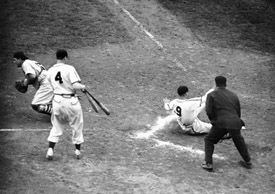 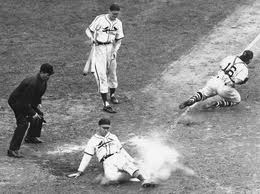
Slaughter scores as Partee takes the throw from Pesky.
Red Sox writers and fans second-guessed Cronin's 8th-inning pitching decisions.
- First, some wondered why he brought in Klinger instead of one of his starters, Hughson or Harris. That's what Dyer did when Dickson got in trouble.
- Or why not southpaw Earl Johnson, they asked? The speedy, left-handed hitting Slaughter was first up and needed to be kept off base. Also, Johnson had already made two appearances in the Series, giving up one hit and one run in three innings.
- Then Joe passed up another opportunity to bring in Johnson to face Walker. In addition to giving left-handed batting Harry a bigger challenge, Earl could have held Enos closer at 1st.
- Cronin's pitching selections even angered some American Leaguers listening on the radio in Canada. Doc Cramer of the Tigers recalled: During the '46 Series, I was in Canada, barnstorming with Allie Reynolds and three or four others, and we were listening to the game against the Cardinals when Slaughter ran all the way around and scored. Cronin brought in a guy by the name of Klinger. A National Leaguer. Couldn't pitch any. The seventh game of the World Series, and he brings him in! And he had guys like Hughson, all those young boys, good arms, and he didn't bring them in. He lost the Series. When we heard Klinger was coming in, we didn't even listen. We got up and left the radio. We said, "That's it." And it was.
|
|
|
9th inning
- Far be it from this exciting series to end quietly. Cardinal fans were confident with Brecheen on the mound, but they didn't know how sick he was.
York bounced a single past Kurowski. Paul Campbell ran for Rudy.
Hitting away, Doerr dropped a single into short LF just past a lunging Marion. Campbell, the potential tying run, stopped at 2B.
The Cardinals gathered at the mound. Some looked to their dugout, but Dyer made no move. They discussed what to do if the Red Sox bunted and decided they'd try to get Doerr to keep the go-ahead from getting into scoring position.
Dyer said afterward: When the first two Red Sox got hits off him in the ninth, I decided right then and there to let him stay in. He had gotten out of tight spots so many times this season that I sort of figured he might do it again. But if he failed this time, I was going right along with him even if we lost the game.
Following the rules of Baseball 101, Higgins bunted down the 3B line but too hard. Kurowski threw to Marion to force Doerr. Still, the tying run now stood only 90' from home with only one out.
But Brecheen got Partee to foul to Musial, who caught the ball after a long run and immediately fired home in case Campbell had any thought of trying to score.
So Red Sox hopes came down to Tom McBride, a backup outfielder who hit .301 in '46 and whose scratch single in the 9th inning tied Game 1. He hit what Brecheen called "a good screwball" on the ground to Schoendienst. The ball bad hopped enough to roll up Red's right arm, but he corralled it and tossed to Marion just in time for the force at 2B.
Brecheen: The nicest pitch I think I made all season was the one I threw Tom McBride to end the game. It was a screwball, and it broke nicely so that Tom couldn't do much with it.
The final play had particular significance for Schoendienst, as he explained in his autobiography: The Red Sox mounted a threat, putting two runners on with two outs. The next batter, pinch-hitter Tom McBride, hit a slow roller toward me that looked as if it would be an easy chance. Instead, just as I went to field the ball, it took a crazy hop and I blocked the ball with my left shoulder. Luckily I was able to trap it, and flipped the ball to Marion covering second for the final out. ... (His girlfriend) Mary was sitting in the stands, watching the game with her family. We had talked about getting married, but she still hadn't officially been granted her family's blessing. One of the people at the game was her grandfather, Patrick O'Reilly. "He was still not sure about Red, until he made that play," Mary recalled. "After the ball hit him in the chest, then rolled up his arm, and he still made the play and we won the game, then my grandfather said, 'You can marry him now.' He had not been too happy about that 'German' I was going to marry."
The Cards mobbed Brecheen, the first pitcher to win three World Series games since Stanley Coveleski of the 1920 Indians and the first portsider to accomplish the feat.
- The Cards, a 7-20 long shot, had just won their sixth World Series in 21 years.
- Rice and Musial hoisted Harry onto their shoulders and marched him triumphantly off the field. Other Redbirds lifted their rookie manager onto their shoulders.
- Hundreds of fans poured out of the stands.
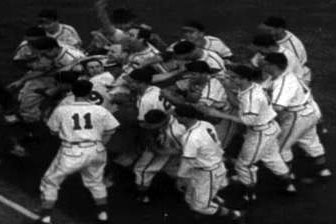
Jubilant Cardinals rush off the field. Video highlights of the 1946 World Series
|
Pandemonium reigned throughout St. Louis.
- Fans threw confetti, adding machine tape, shredded telephone books, business forms, and toilet paper out of office windows. Parts of Olive and Washington [streets] were soon ankle deep in paper, reported the Post-Dispatch. Drivers honked their horns incessantly.
- Startled pigeons fluttered from their perches on the downtown skyscrapers.
- The celebration lasted well into the evening in taverns and restaurants. A mild October night felt like New Year's Eve, said the Star-Times.
Postgame
It took a while for the Redbirds to settle down in the dressing room.
- James P. Dawson of the New York Times described the chaotic scene like this:
A partition was shattered. Caps, gloves, shirts, towels, belts flew all over the place. ... Players were trampled. Commissioner Happy Chandler was trampled. So was President Ford Frick of the National League, who then was hoisted aloft on the shoulders of Slats Marion and Clyde Kluttz. President Will Harridge of the American League was elbowed and jostled.
- Cronin fought his way through the noisy mob to congratulate a "dazed-looking" Dyer. You've been a great fellow all year, Joe told his opposite number.
- The players called for beer now that the training rules were suspended. When well iced beer was brought forth in bushel baskets, P Red Barrett bellowed, Why not champagne? Dyer replied, I'll buy it, boy. I'll buy it. Players poured beer over each other's heads.
- An exception to the general hilarity was Garagiola, the rookie C who hit .316 in the Series with 4 RBI. He was in Doc Weaver's training room for treatment of his injured finger.
The Cardinals finally spoke to the press.
- Dyer hugged owner Breadon, who proclaimed, We'll win it again next year! Dyer's 16-year-old son pushed his way through the mob and hugged his dad, who had given him permission to miss school that day. Then Eddie talked to reporters with a voice that was hoarse from shouting. We never lost a game we had to win. What a series! What a victory! I'm glad we won for myself. It justifies the confidence of a lot of fine people who had faith and thought I could manage a ball club. It was a marvelous victory. We beat a great ball club. But I think we deserved to win. We proved ourselves the better outfit. That's not taking anything away from the Red Sox. ... That little Cat. He's great, isn't he? A grand little fellow, and what pitching courage. All year long, he never failed when the chips were down. I figured I could get two innings from him. ... I don't want you to think I am trying to pat myself on the back, but it was a lot of personal satisfaction to me to be able to prove to some people, despite their misgivings, I could manage a big league ball club. The Cards skipper also made a confession. Now that the series is over, I want to confess I held my breath every time Ted Williams came to bat. He's a great hitter and likely to break up a ball game every time he swings the bat. Fortunately, we faced him when he was not going good, but he sure gave us some anxious moments. Eddie also gave credit to the Cards' trainer, Doc Weaver, for the magic he had worked on Slaughter, Moore, and Pollet.
- Brecheen surprised reporters when he admitted he had been sick. But I filled up with aspirin, and when I went in, my arm felt good. ... In a series, you can't get any rest. Telephone calls day and night. The only time I got any real rest was when we came out here for a workout. I don't want to see another baseball for a long, long time. Harry cried out, Who got the [game] ball? Marion brought it over. I was saving it for you.
Years later, Brecheen was asked if he was tired entering the final game. If you're going for the Series, it doesn't make any difference if your arm is hanging. You'll warm it up and go out there. ... I only made one bad pitch. On a 3-and-2 count, I gave Dom DiMaggio a high screwball. He hit it off the RF fence. You couldn't fool him too much.
- Slaughter answered questions with his right arm heavily bandaged. I just had to run, that's all. Mike gave me the green light. He was watching the ball. He knew what could be expected. And I just dug in and tore for home. It was the Sox's responsibility to head me off. The odds were riding with me. Enos credited his speed to Billy Southworth, who taught me to run on my toes. He also stated that his arm was aching like an ulcerated tooth before the game and that he hoped he wouldn't have to do any throwing. Yet he had to fire the ball twice. I hurt my arm severely the last time I threw the ball, but I had to cut loose. I couldn't hold back. I'll have all winter to rest it, and maybe it will be all right by the time we start playing again.
- Walker, whose .412 average led all hitters in the Series: I hit a low pitch that was sinking in that eighth inning. This is the biggest thrill of my life, driving in that winning run. ... What a game! What a finish! ... My regular season average was only a decoy! Them Sox pitchers kept thinking "here's a guy who can't hit nothin'."
- Marion: We won the World Series by stopping Williams.
- Musial: Experience may have had a lot to do with it ... These Red Sox are good. ... But we've been in this before ... I want to say this for Boston, though. It was a great Series and they played wonderful ball, clean, not any bickering, no dusters.
- St. Louis owner Sam Breadon: I got more satisfaction out of winning this series than the other five combined. Those Cardinals who conquered the Red Sox have guts ... They never quit ... never knew when they were licked. I may have owned better ball clubs but certainly never a gamer one. The Red Sox were overvalued. We were undervalued. ... They never were used to the Cardinals' type of play. A fighting team with marvelous team spirit won. Sam added that Dyer did a marvelous job.
Musial, the NL MVP whose weak Series performance (.222, 4 WB, 1 3B, 0 HR, 4 RBI) was forgotten because of his team's victory and the tribulations of his AL counterpart (who made over three times what Stan took home), pushed through the throng of fans gathered outside the clubhouse gate. The Cardinal star hurried to the airport for a flight to Los Angeles where he would join Bob Feller's barnstorming tour. Neither Musial nor Williams would ever play in another World Series.
A Tale of Two Locker Rooms
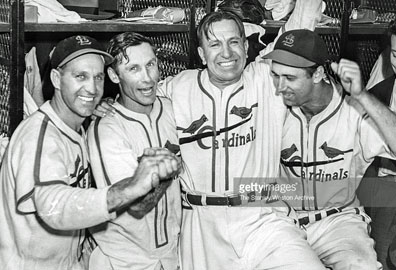 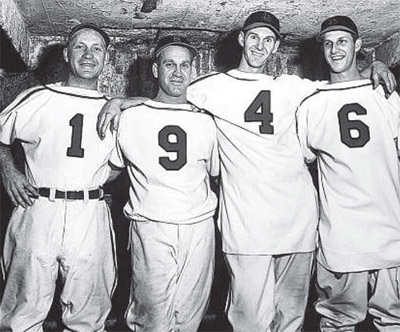
L: Slaughter, Brecheen, Dyer, and Walker exult. R:
Kurowski, Slaughter, Marion, and Musial proclaim the year of the Cardinals.
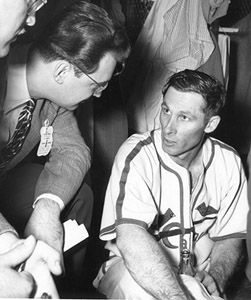 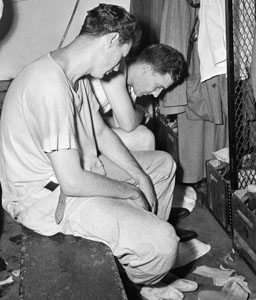
L: Young Cardinals broadcaster Harry Caray talks to another Harry, Brecheen
Right: Mickey Harris shares Ted Williams' dejection.
In the quiet Red Sox locker room, the sounds of the jubilant Cardinal celebration could be heard through the wall.
- Reporters gathered around Pesky. It's my fault. I'm to blame. I never expected he'd try to score. I couldn't hear anybody hollering at me above the noise of the crowd. If I was alert, I would have had him. When I finally woke up and saw him running for home, I couldn't have gotten him with a .22. ... I'm the "goat." No mistake about that. I gave Slaughter at least six strides with that delay. I know I could have nailed him if I had suspected he would try for the plate. Slaughter simply outsmarted me - that's all there is to it.
- Ferriss: I felt all right. I had my stuff. Those were good pitches they hit. I just don't understand it.
- Speaking almost in whispers, Cronin paid tribute to the Cardinal outfielders when he finally arrived. Those three fellows really played a hell of a series. I went into the Cardinals' dressing room and congratulated them all - Dyer, Moore, and the rest. ... A pretty good ball club beat us, a great defensive club. We just couldn't get a base hit when we needed it. It was a tough one to lose. The Boston manager was interrupted by Commissioner Chandler who shook hands and said, Joe, you're a great credit to baseball. Cronin replied, Thanks, Commissioner. I thought the umpiring was all right too. When a reporter asked whether Pesky saw Slaughter rounding 3B, Joe said, The less said about the play, the better. Pesky is a great little ball player, and he has a great career ahead of him. Let's forget it.
- Owner Tom Yawkey made the rounds, patting players on the back but stopping for an extra word with Williams, who sat glumly by his locker still in uniform except for his shoes, staring mournfully at the floor for at least 30 minutes.
- Commissioner Chandler went over to Williams and whispered God love you, Ted. I never missed so many balls in my life, the Splinter replied. Finally, clubhouse man Johnny Orlando warned his buddy (who gave him his World Series check for all the favors he had done during the season) that he would miss the bus to the train station if he didn't get a move on. Gordon Campbell of the Boston Traveler reported seeing Ted alone in the shower sobbing his heart out after almost everyone else had left.
By the time Williams finally dressed, few were left in the clubhouse. A knot of Cardinal fans jeered Where's Superman? as he passed on his way to the bus. Arriving at Union Station, Ted walked alone to the train disconsolate. On board, the Red Sox slugger could be seen sitting by a window crying. If he had known that he would never have a chance to redeem himself in another World Series, he would have sobbed even more.
When the train arrived in the Hub city, three hundred fans awaited. A policeman friend whisked Ted away as soon as he disembarked.
Mayor James Curley contemplated giving the Red Sox a public banquet and reception. However, the club's management notified him that the players wanted to return to their homes and did not want any public function.
The players shared in the proceeds of the first four games, as usual.
- Each Cardinal took home $3,757.04.
- Any Boston player voted a full share received $2,052.03, which was less than the $2,500 each umpire earned.
An editorial in the Boston Herald the next day summarized the Series like this:
"We Was Robbed"
To paraphrase a famous lyric of baseball, there is no joy in Boston today, for the mighty Red Sox, getting their first chance at a World Series in 38 years, have struck out. Yesterday's last-ditch stand in St. Louis, in which everything happened that can happen in a ball game, will be subject for Stove League discussion, and there will, of course, be some "goats."
There are fans who will ... charge that "we was robbed," as, indeed we were. But others who watched the seven games of the series will admit that the larceny was performed by a fast and opportunist ball club, the kind they are likely to produce out there in St. Louis, where baseball salaries are low and World Series money looks big. These Cardinals are "hungry" ball players, smart, fast and quick-thinking.
You will hear in the Stove League sessions that the Red Sox, a team that breezed home to the American pennant, were not on their toes as were the lean Cards, who fought the National League battle to the bitter end and were tuned for action. As for the goats, these will be Pesky, who underestimated the speed of the enemy in the eighth inning; and Ted Williams, the Casey-like slugger who lamely popped up a fly when he had the chance to win Boston's game. You will hear plenty more, too.
But Ted Williams survives as a phenomenon who dominated the series even though he was handcuffed through seven games by the St. Louis pitchers, who were very much afraid of him. He was momentarily expected to explode in a storm of base hits, but he didn't, and neither did his teammates. ...
1946 World Champion St. Louis Cardinals
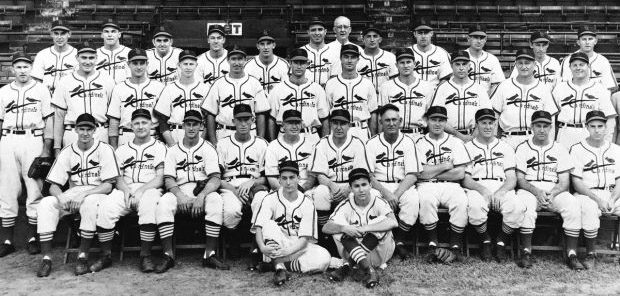 References: The World Series, David S. Neft & Richard M. Cohen (1990)
Redbirds Revisted: Great Memories and Stories from St. Louis Cardinals, David Craft and Tom Owens (1990)
The Seventh Game, Barry Levenson (2004) | Ted Williams: A Baseball Life, Michael Seidel (1991)
Memories of a Hall of Fame Sportswriter, Bob Broeg (1995)
Red: A Baseball Life, Red Schoendienst with Rob Rains (1998)
The Teammates: A Portrait of Friendship, David Halberstam (2003)
The Victory Season: The End of World War II and the Birth of Baseball's Golden Age, Robert Weintraub (2013)
Tim McCarver's Diamond Gems: Favorite Baseball Stories from the Legends of the Game,
im McCarver with Jim Moskovitz and Danny Peary (2008)
Red Sox Nation: The Rich and Colorful History of the Boston Red Sox, Peter Golenbock (2015)
|
|





















